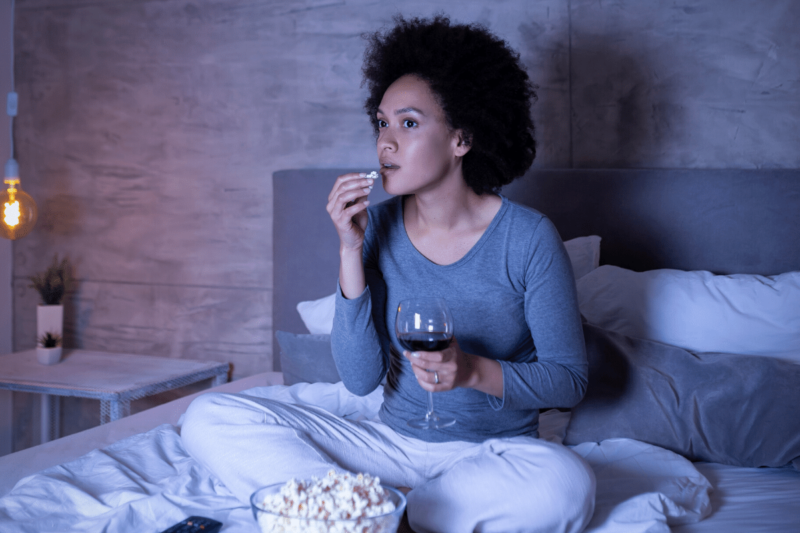Table of Contents

Even though the pandemic is mostly behind us, there’s still a lot of uncertainty right now in the world, politically, economically and environmentally. While it’s always important to take care of yourself, self-care may be even more important in times of uncertainty.
I’m always an advocate of physical and emotional self-care, because if you don’t take care of yourself, who will? Self-care is not selfish! But self-care isn’t all chocolate cake and salt baths. The reality is that true self-care can sometimes feel…hard. So I want to offer you some food for thought, as well as some self-care tips for creating or refining an overall self-care practice that’s right for you.
What are you feeling, what do you need?
If you struggle with “emotional” eating or binge eating disorder, anxiety, fear, loneliness, boredom or frustration (and maybe all of the above) can also make you feel like you’re out of control with food, or in immediate danger of becoming so.
My gentle advice is to try to nourish yourself the best you can. If you need to seek some comfort and emotional self-care from food, and no other coping mechanisms will quite cut it, then do what you need to do, and show yourself some compassion, too.
However, if you do find yourself frequently using food as a balm by hitting your favorite restaurant, grabbing takeout, or eating a bowl of popcorn on the couch and calling it dinner, it might be time to step back and assess the situation. When you frequently use food as a reward for making it through the day, you’re probably aren’t making food choices that support your overall well-being. Possible solutions include:
- Batch cooking when you have the time and energy, or at least reducing the number of nights you cook through leftovers.
- Developing a repertoire of a few nutritious dinners that you can prepare with little time or effort.
- Listening to music (or a podcast), you love while you cook.
- Planning a restaurant towards the end of the work week. This gives you something to look forward to, plus you can make a more informed — and less impulsive — decision about what to eat.

Limit self-medicating
Some people self-medicate with food, others use alcohol to unwind, while others use distraction techniques. Often, the “devil” is in the dose.
Some health experts say that some of the observed health benefits of moderate alcohol intake might be because it helps people relax. But food and alcohol can easily become stand-ins for more substantial, healthful means of managing stress. When one glass of wine turns into two (for women) or into more than two (for men) day after day, you might consider that to be the proverbial canary in the coal mine.
Staying up late with a good book, movie or Netflix series can take your mind off the stresses of the day (or week, month or year), but this form of mental self-care can backfire if it comes at the expense of sleep.
Research shows unequivocally that sticking to a consistent sleep schedule — not varying your bedtime and wake time by more than about an hour — is important for quality sleep. And it really is about quality, not just quantity. When your sleep is off, it can throw off everything else, including nutrition, movement and stress management. That’s why one of my universal self-care tips is to find a way to balance evening activities and hobbies that “feed” us with a solid sleep routine
Be mindful about media
Yes, it’s important as a human and a citizen to be aware of what’s happening in our country, and the world. However, constant news checking can feed stress and anxiety while not actually helping you be better informed. (Another thing that’s not great for mental and emotional self-care.) Remember that there was a time in the not-so-distant past when we didn’t have news available to us 24-7, and it was still possible to keep up with news and events.
I strongly recommend not looking for information on social media. At best, other people’s anxiety may feed your own. At worst, it’s flat-out inaccurate. I have a carefully curated Instagram feed that includes many social justice activists, and while I appreciate their content, sometimes after consuming too much of it I can feel my anxiety rising — and I’m not someone who struggles with anxiety, generally.

Create a personal self-care plan
When you’re already stressed, rattled or anxious, it’s hard to make self-care decisions that honor your physical and mental health and well-being.
When you don’t already have a self-care plan in place that helps you stay relatively calm and balanced, it can be hard to get started, or even to identify what you need to meet your needs. Self-compassion is one place to start.
Even if self-compassion doesn’t come easily to you, you can place your hand on your heart and feel it’s warmth. You can take a breath, and say to yourself, “This feels hard,” or “Life feels hard.” Then you can ask yourself, “What do I need to feel a bit better?” From there, start to put together a personalized self-care plan that you can refer to whenever you need to. Maybe a few ideas on this self-care list will resonate with you:
- Being in nature (this includes your garden)
- Cuddling a furry animal friend
- Cuddling a human friend or partner
- Reading, knitting, quilting or crafting
- Watching funny or feel-good movies or shows
- Listening to music that moves or energizes you
- Having deep conversations with those near and dear to you
- Enjoying some quiet, unstructured time
- Enjoying social time in large groups
- Getting adequate sleep
- Wearing comfy clothes
- Meditating or journaling
- Eating food that nourishes your body and your tastebuds
- Moving your body in ways you enjoy
- Pampering yourself with baths, long showers or massages
- Investing in help with some of your to-do’s (housecleaners, grocery delivery)
- Giving back through volunteer or advocacy work
Carrie Dennett, MPH, RDN, is a Pacific Northwest-based registered dietitian nutritionist, freelance writer, intuitive eating counselor, author, and speaker. Her superpowers include busting nutrition myths and empowering women to feel better in their bodies and make food choices that support pleasure, nutrition and health. This post is for informational purposes only and does not constitute individualized nutrition or medical advice.
Seeking 1-on-1 nutrition counseling? Carrie offers a 6-month Food & Body program (intuitive eating, body image, mindfulness, self-compassion) and a 4-month IBS management program (low-FODMAP diet coaching with an emphasis on increasing food freedom). Visit the links to learn more and book a free intro call to see if the program is a good fit, and if we’re a good fit!
 Print This Post
Print This Post





More Stories
Avocado Cacao Mousse – JSHealth
Janelle Brown on Garrison’s Mental Health Before His Death
How To Finally Beat Insomnia